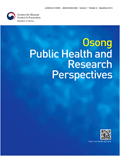
Osong Public Health and Research Perspectives
Scope & Guideline
Transforming public health discourse with cutting-edge research.
Introduction
Aims and Scopes
- Public Health Surveillance and Epidemiology:
The journal emphasizes the importance of surveillance systems and epidemiological studies to monitor disease patterns, outbreaks, and public health responses, particularly in the context of infectious diseases. - Infectious Diseases and Vaccination:
A significant focus is placed on research related to infectious diseases, including studies on vaccine effectiveness, safety monitoring, and the impact of pandemics on healthcare practices. - Health Systems and Policy Research:
The journal addresses the challenges and innovations in health system strengthening, including budget mobilization, capacity building, and responses to health emergencies. - Chronic Diseases and Non-communicable Diseases (NCDs):
Research on chronic diseases, comorbidities, and their implications for public health is a core area, highlighting the intersection of infectious and non-communicable diseases. - Mental Health and Well-being:
Recent publications indicate a growing interest in mental health issues, particularly in the context of public health emergencies like the COVID-19 pandemic. - Global Health Security and Preparedness:
The journal underscores the necessity of global health security, preparedness for pandemics, and the role of international collaboration in addressing health threats.
Trending and Emerging
- COVID-19 Research and Its Aftermath:
A significant portion of recent publications has focused on COVID-19, including vaccine effectiveness, mental health impacts, and long COVID. This trend highlights the pandemic's profound influence on public health research. - Immunoinformatics and Vaccine Development:
There is a growing emphasis on the use of immunoinformatics for vaccine design, particularly for emerging infectious diseases, showcasing innovative approaches to public health challenges. - Mental Health Impacts of Pandemics:
Research on the mental health consequences of the COVID-19 pandemic is increasingly prominent, reflecting a broader understanding of health that encompasses psychological well-being. - Health Equity and Vulnerable Populations:
Recent studies have begun to focus more on health disparities and the impact of health crises on vulnerable populations, indicating a shift towards addressing social determinants of health. - AI and Data Science in Public Health:
Emerging trends in employing artificial intelligence and advanced data analytics for forecasting and public health management are gaining traction, reflecting technological advancements in the field.
Declining or Waning
- Traditional Infectious Disease Studies:
There appears to be a waning focus on classic studies of infectious diseases that do not incorporate novel methodologies or address contemporary challenges, particularly as the field increasingly emphasizes pandemic preparedness and responses. - Basic Health Education and Awareness Campaigns:
Research centered solely on basic health education strategies has become less prominent, possibly due to a shift towards evidence-based interventions and more complex public health strategies. - Longitudinal Studies on Non-communicable Diseases:
Longitudinal research on non-communicable diseases may be declining as the journal shifts toward more immediate public health concerns, particularly those arising from the COVID-19 pandemic.
Similar Journals
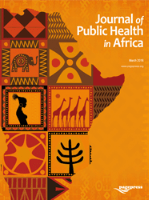
Journal of Public Health in Africa
Shaping the future of public health in the African context.Journal of Public Health in Africa (ISSN: 2038-9922, E-ISSN: 2038-9930) is a premier open-access journal published by PAGEPRESS PUBL, dedicated to advancing the field of public health within the African context. Established in 2010, this journal provides a platform for researchers, practitioners, and policymakers to disseminate original research, reviews, and case studies that contribute to the understanding of public health challenges and advancements in Africa. With its increasing visibility, the journal is positioned in the Q4 quartile in the categories of Public Health, Environmental and Occupational Health and currently ranks #474 out of 577 in its field according to Scopus metrics. The open access model ensures that vital research is freely accessible to a global audience, thus enhancing knowledge sharing and collaboration. Since coverage of the journal has been discontinued in Scopus after previous years, authors are encouraged to contribute innovative findings which address pressing health issues, ultimately striving to improve health outcomes across the continent. The journal is based in Italy and invites submissions from diverse disciplines to promote a multidisciplinary approach to public health.

EPIDEMIOLOGY AND INFECTION
Advancing the Science of Disease DynamicsEPIDEMIOLOGY AND INFECTION is a premier open-access journal published by Cambridge University Press, dedicated to advancing the field of epidemiology and infectious diseases. With an ISSN of 0950-2688 and E-ISSN of 1469-4409, this journal has been at the forefront of disseminating impactful research since its inception in 1970. As of 2023, it holds a prestigious Q2 ranking in both the fields of Epidemiology and Infectious Diseases, reflecting its significant contribution to these critical areas of study, with Scopus rankings placing it at #70 in Epidemiology and #163 in Infectious Diseases. The journal aims to publish high-quality, peer-reviewed studies that contribute to our understanding and management of infectious diseases globally. Operating under an open-access model since 2020, EPIDEMIOLOGY AND INFECTION ensures that research is accessible to a wide audience, fostering collaboration and innovation among researchers, professionals, and students alike. With a commitment to excellence, this journal is an essential resource for those looking to stay abreast of the latest developments in epidemiological research and infectious disease management.
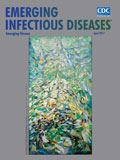
EMERGING INFECTIOUS DISEASES
Empowering Researchers to Tackle Emerging DiseasesEmerging Infectious Diseases, published by the Centers for Disease Control and Prevention, is a leading open-access journal that has been dedicated to the field of epidemiology, infectious diseases, and medical microbiology since its inception in 1995. With an impressive impact factor placing it in the Q1 quartile rankings for multiple categories including Epidemiology, Infectious Diseases, and Medical Microbiology, this journal serves as a vital resource for researchers, practitioners, and students dedicated to combating the challenges posed by emerging infectious diseases. The journal's distinguished Scopus ranks further highlight its global influence, ranking #10 in Epidemiology, #26 in Infectious Diseases, and #13 in Medical Microbiology, all within the top percentiles. Accessible and targeted, Emerging Infectious Diseases publishes seminal research and reviews that contribute to the understanding and management of infectious diseases, ensuring that critical insights reach a broad audience. The journal encourages contributions that advance the scientific community’s knowledge and responses to public health challenges.

JMIR Public Health and Surveillance
Transforming public health research into actionable knowledge.JMIR Public Health and Surveillance is a premier open access journal that has been at the forefront of public health research since its inception in 2015. Published by JMIR PUBLICATIONS, INC in Canada, this journal holds an impressive Q1 ranking in both Health Informatics and Public Health, Environmental and Occupational Health as of 2023. With a commendable Scopus Rank of #18 out of 665 in Public Health and #10 out of 138 in Health Informatics, JMIR Public Health and Surveillance stands out for its rigorous peer-reviewed articles that contribute significantly to the advancement of knowledge in these vital fields. The journal is committed to promoting research that advances the understanding and surveillance of health trends, disease outbreaks, and population health metrics, thus serving as an invaluable resource for researchers, professionals, and students alike. By facilitating open access to high-quality content, it ensures that results of critical public health research are readily available, ultimately helping to inform policy and public health initiatives across the globe.

Global Health Research and Policy
Fostering collaboration for worldwide health improvement.Global Health Research and Policy, published by BMC, is a leading open-access journal dedicated to advancing the field of global health through impactful research and policy analysis. Since its establishment in 2016, the journal has garnered a prestigious reputation, achieving a Q1 ranking across several categories including Epidemiology, Health Policy, Health (social science), and Public Health, Environmental and Occupational Health in 2023. With an E-ISSN of 2397-0642, this UK-based journal ensures the dissemination of high-quality research to a global audience, promoting accessibility and collaboration. The open-access model facilitates the sharing of knowledge and innovation essential for addressing pressing health challenges worldwide. Researchers, professionals, and students alike will find valuable insights and relevant policy discussions in each issue, making Global Health Research and Policy a vital resource for those committed to improving health outcomes on a global scale.
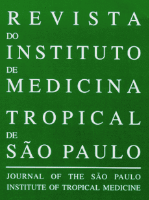
REVISTA DO INSTITUTO DE MEDICINA TROPICAL DE SAO PAULO
Advancing Knowledge in Tropical MedicineREVISTA DO INSTITUTO DE MEDICINA TROPICAL DE SAO PAULO is a prestigious open-access journal that has been publishing significant research in the field of tropical medicine since its inception in 1961. Produced by the Instituto de Medicina Tropical de São Paulo, the journal boasts a commendable Q3 ranking in both the categories of Infectious Diseases and Medicine (miscellaneous), as per the latest 2023 metrics. With an ISSN of 0036-4665 and E-ISSN of 1678-9946, it serves as a prominent platform for scholars and professionals to disseminate their findings and insights on pressing health issues prevalent in tropical regions, particularly those relevant to Brazil and beyond. This journal is essential for researchers and practitioners who seek to advance their understanding and apply innovative solutions in tropical medicine, thus addressing the distinct challenges posed by infectious diseases in diverse populations. The journal is accessible through various open access platforms, ensuring that critical research is available to a global audience, fostering knowledge sharing and collaboration.
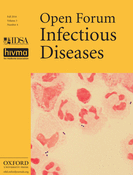
Open Forum Infectious Diseases
Innovating solutions for evolving health challenges.Open Forum Infectious Diseases (ISSN: 2328-8957; E-ISSN: 2328-8957) is a leading open-access journal published by Oxford University Press, dedicated to advancing the field of infectious diseases. Since its inception in 2014, the journal has provided a platform for researchers to disseminate impactful findings in a rapidly evolving domain, achieving a remarkable Q1 ranking in both the Infectious Diseases and Oncology categories as of 2023. The journal encourages rigorous and innovative research, contributing significantly to global health discussions and informing best practices in clinical settings. As an open-access journal, it ensures that its content is accessible to a wide audience, fostering collaboration and knowledge sharing among researchers, professionals, and students alike. Positioned in the heart of the United States, Open Forum Infectious Diseases serves as a critical resource for the academic community, and its continued commitment to quality and relevance secures its status as an essential publication in the field.

Biosafety and Health
Advancing global health through rigorous research.Biosafety and Health is a leading peer-reviewed journal published by ELSEVIER, dedicated to advancing knowledge and practice in the fields of biotechnology, infectious diseases, microbiology, and public health. With an ISSN of 2096-6962 and an E-ISSN of 2590-0536, this Open Access journal has been accessible to the global research community since 2019, fostering collaboration and innovation from its base in the Netherlands. Ranked Q2 in multiple categories according to the latest metrics, including Biotechnology and Microbiology (medical), it stands as a testament to high-quality, impactful research that influences clinical and environmental practices. The journal has achieved substantial recognition in various medical fields, ranking in the 88th percentile for Public Health, Environmental and Occupational Health, and the 78th percentile for Infectious Diseases. Researchers and practitioners seeking to contribute to this evolving domain are encouraged to submit their findings, as the journal aims to promote interdisciplinary dialogue and address pressing global health challenges.
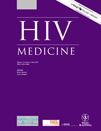
HIV MEDICINE
Transforming Insights into Action Against HIVHIV Medicine is a prestigious journal published by Wiley that stands at the forefront of research in the fields of health policy, infectious diseases, and pharmacology, with a commendable impact factor reflected in its Q1 rankings for 2023. Established in 1999 and set to converge its expertise through 2024, this journal plays a critical role in advancing the understanding and treatment of HIV and related health challenges. It is esteemed for its rigorous peer-review process and its contributions to both clinical and policy-oriented discussions surrounding HIV medicine. With a broad international readership, it serves as a vital resource for researchers, healthcare professionals, and students committed to fighting the global HIV epidemic. Although not open access, its vital insights are indispensable for anyone involved in infectious disease research and healthcare policy. Articles published in HIV Medicine shape global health strategies and influence the future of HIV research, making it a must-read for those dedicated to this crucial field.
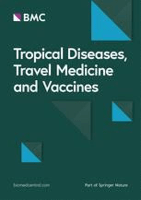
Tropical Diseases Travel Medicine and Vaccines
Empowering professionals with cutting-edge insights on tropical diseases.Tropical Diseases Travel Medicine and Vaccines, published by SPRINGERNATURE, stands at the forefront of research in the fields of infectious diseases and public health, with an impressive impact factor that signifies its relevance and influence. Since its inception in 2015, this peer-reviewed journal has maintained an open access policy, ensuring that cutting-edge research on tropical diseases and travel medicine is readily available to researchers, professionals, and students worldwide. The journal currently ranks in the Q2 Quartile for both Infectious Diseases and Public Health, Environmental and Occupational Health, reflecting its substantial contribution to these critical areas of study. With a strong Scopus rank of #176 in Public Health and #138 in Infectious Diseases, it serves as a vital platform for innovative studies that advance understanding and response strategies related to tropical diseases. For its vast audience, Tropical Diseases Travel Medicine and Vaccines not only acts as a bridge connecting researchers with practical applications but also nurtures academic discourse essential for future advancements in global health.